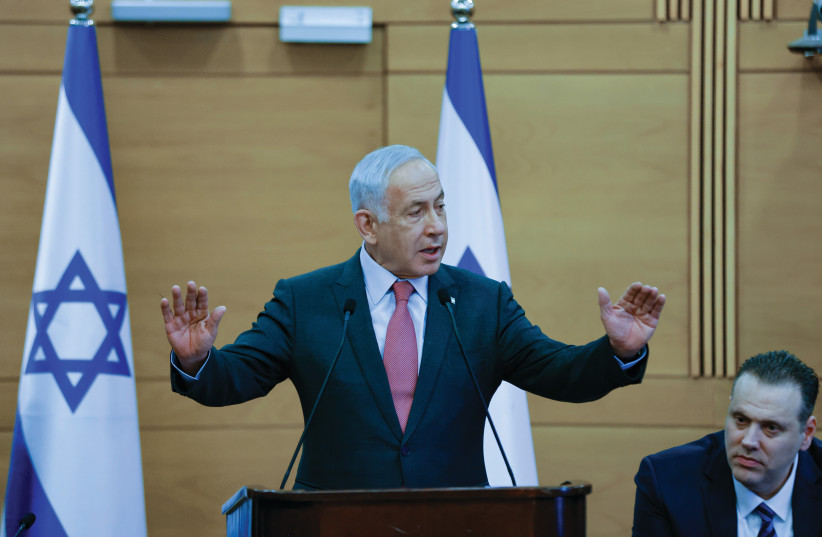The consequences of the political crisis in Israel may go well beyond the immediate fallout from the government’s judicial overhaul. We could very well be witnessing the early stages of a dramatic realignment of Israel’s political landscape; that is, a shift of voter preferences as old allegiances make way for new choices and political camps.
Earlier instances of shifting political divisions tended to be tumultuous and painful, whether they took place in Israel, the United States or elsewhere. The current situation is no exception.
<br><strong>But how did we get here?</strong>
In recent years, the Likud has truly been Israel’s party of the people. While most other parties drew support from relatively narrow constituencies, the Likud attracted divergent groups ranging from settlers and the residents of peripheral towns to seculars in the country’s largest cities.
Maintaining the support of such a broad voter base over time is difficult, as the views of the Likud’s supporters are not aligned on every issue. This is even truer for the current right-wing coalition, which runs the gamut of lawmakers ranging from secular liberals to the ultra-Orthodox.
The supreme interest of the Likud and its coalition should have been to avoid any shakeup that would bring to the surface the core divisions within the Right. Instead, Prime Minister Benjamin Netanyahu’s government has done the exact opposite. To put it bluntly, Netanyahu’s coalition has given different voter blocs good reasons to become angry and concerned.

Religious legislation and moves that bluntly favor ultra-Orthodox voters and politicians were bound to upset some secular rightists. A sweeping judicial reform promoted aggressively and crudely has deepened national rifts and alarmed some right-wing moderates, as did the extreme and outlandish public statements by overly zealous, ultra-populist ministers and backbenchers.
While anyone blunder may have fully alienated only a small percentage of Likudniks, the constant stream of controversies was liable to produce pockets of resistance among disillusioned voters that may ultimately add up to significant numbers. The saga of Defense Minister Yoav Gallant’s would-be ousting seemed to shock many voters and made them question Netanyahu’s judgment and credentials as “Mr. Security,” perhaps his most cherished electoral asset.
The predictable result was the right-wing camp, mostly the Likud, has started to bleed voters. According to recent polls, support for the ruling party has declined by at least 10%-20%. The failure so far of smaller hard-right parties to deliver on ambitious promises has hurt them, as well.
But things could get even worse for the coalition. An escalating terror wave, a mismanaged military conflict or growing economic hardships could further erode the strength of the struggling Netanyahu bloc.
<br><strong>More bad news for Likud</strong>
And here comes the Likud’s other big problem: Unhappy voters have options outside the coalition. These include the ultra-secularist and hawkish Avigdor Liberman or rightist ideologues like Gideon Sa’ar. So far, Benny Gantz’s and Sa’ar’s National Unity party has been the main beneficiary, with support for it surging. At this time, the party appears to embody the Israeli mainstream with its blend of moderate rightists and leftists.
Moreover, the next election could see the emergence of a new moderate right-wing party, as well as the return of former prime minister Naftali Bennett, yet another rightist who is no fan of Netanyahu and may appeal to Center-Right voters.
In contrast, despite political nuances on the Left, dissatisfied leftist voters are unlikely to switch sides as most abhor the current coalition partners. To put it another way, the government’s judicial reform program and other missteps are driving away some right-wing voters while solidifying the Center-Left.
Moreover, the raging debate brought to the fore religious-secular tensions, yet another issue that is more likely to encourage a shift of rightists away from the Likud and its religious allies than the other way around. Overall, the current political upheaval is largely about deep-seated issues rather than temporary problems, so the impact is bound to be long-term.
Finally, the Likud faces yet another challenge: Sooner or later Netanyahu will quit, leaving in his wake a party divided between moderates and populists, none of them possessing the gravitas and charisma of the current prime minister.
Former Mossad chief Yossi Cohen may be an appealing option to voters but he will be an unwelcome rival for Likud bigwigs who have been waiting forever for Netanyahu to go. Even with Cohen out of the picture, any succession battle will likely be ugly, further tarnishing the Likud’s image and possibly triggering a split, assuming the party remains intact until then.
Barring an extraordinary turnaround, the Likud and the pro-Netanyahu camp face a quickly changing political landscape. As voters recalculate their choices, Israel’s future election results and governing coalitions could look very different than what we are seeing today.
The writer is a political and media researcher and analyst. He previously worked as an analyst at the US Embassy in Israel.
